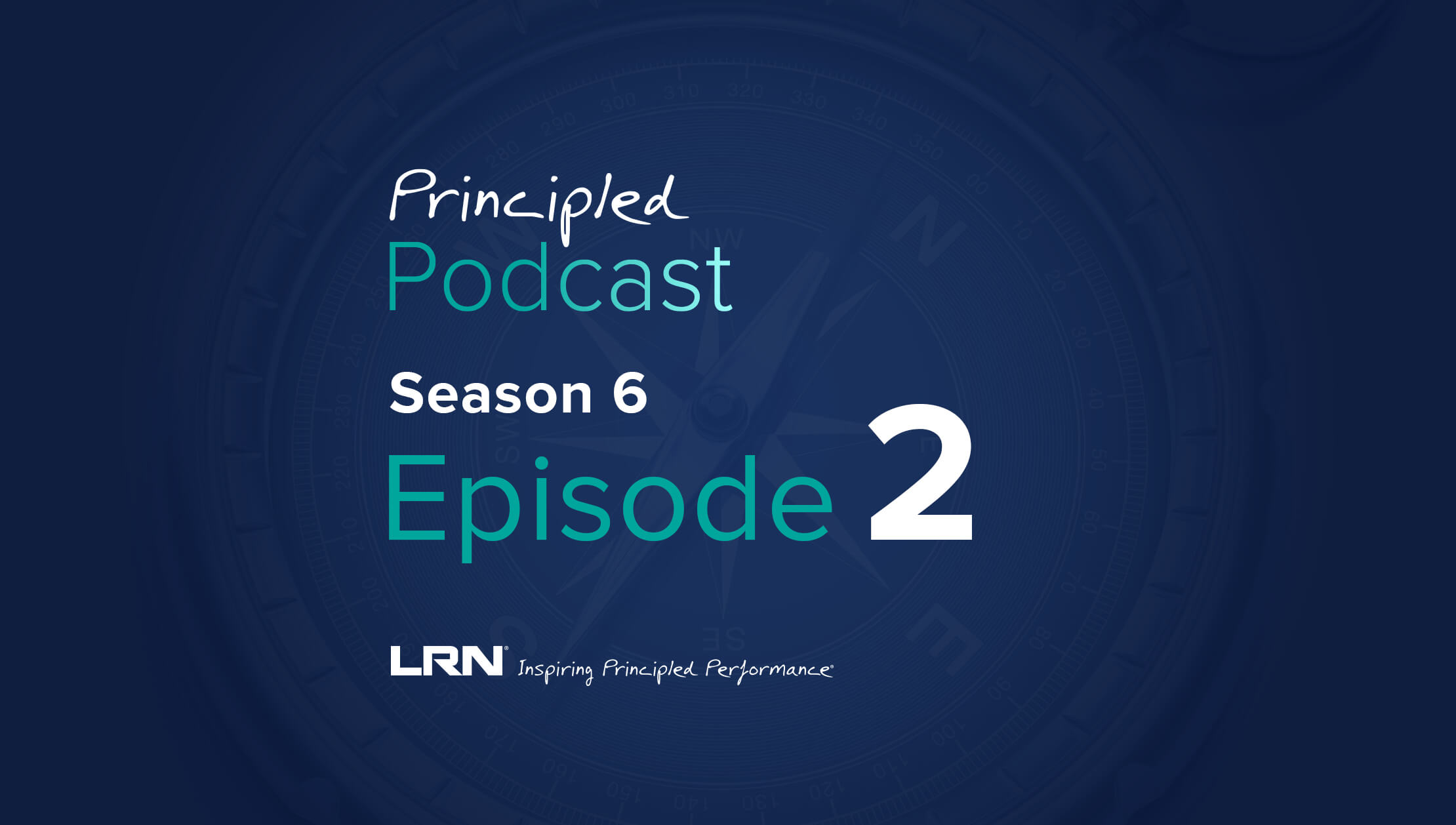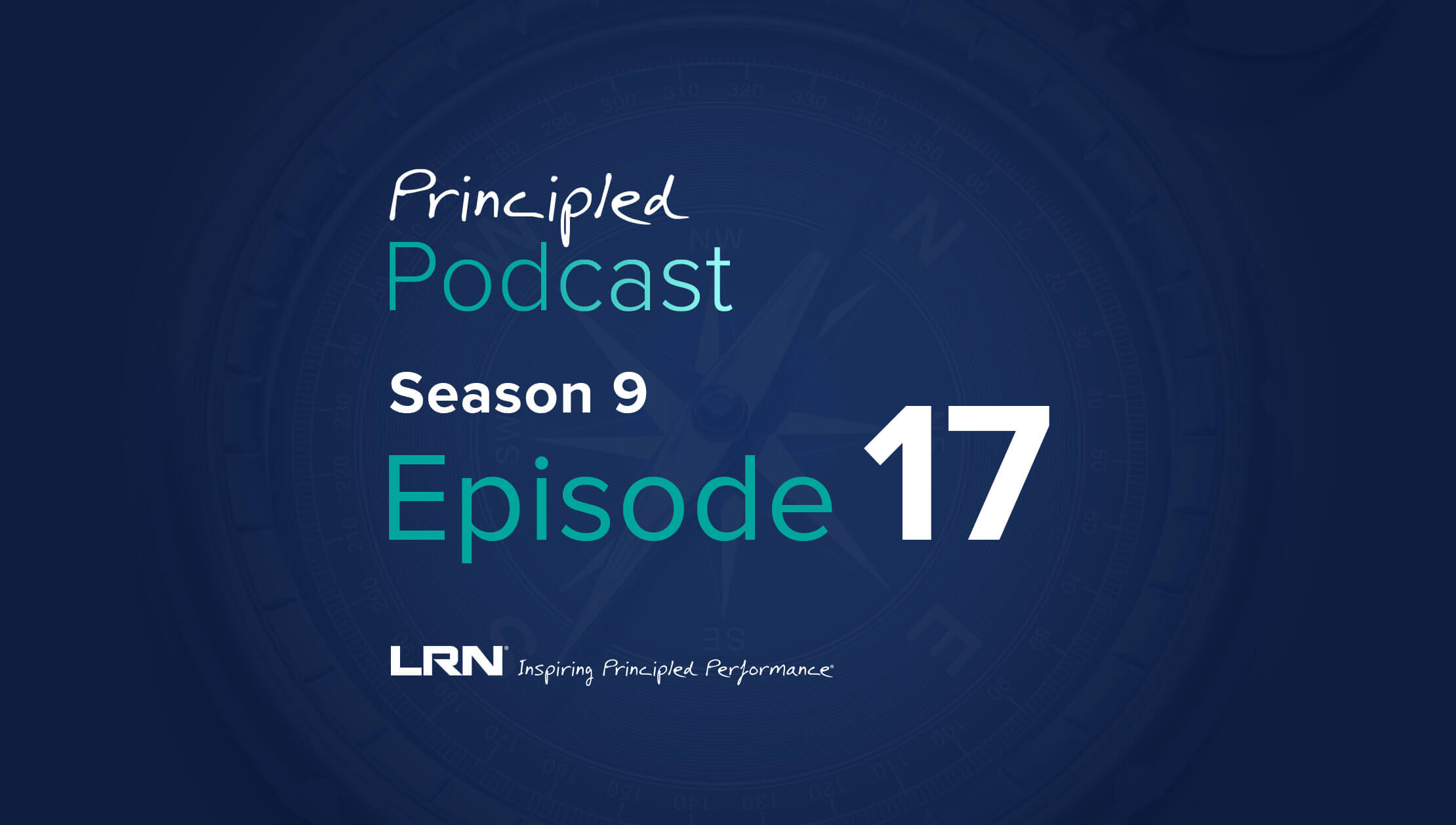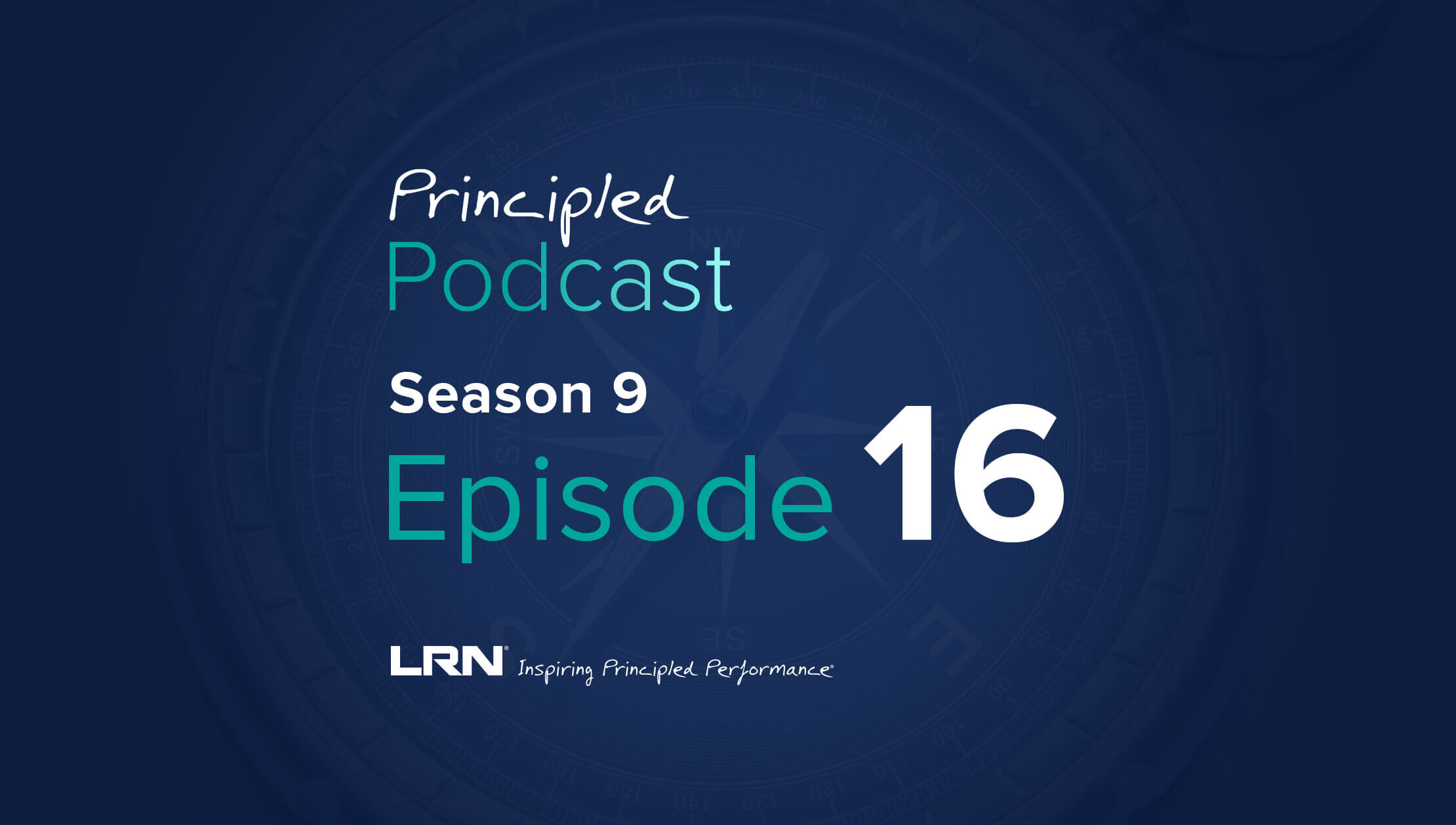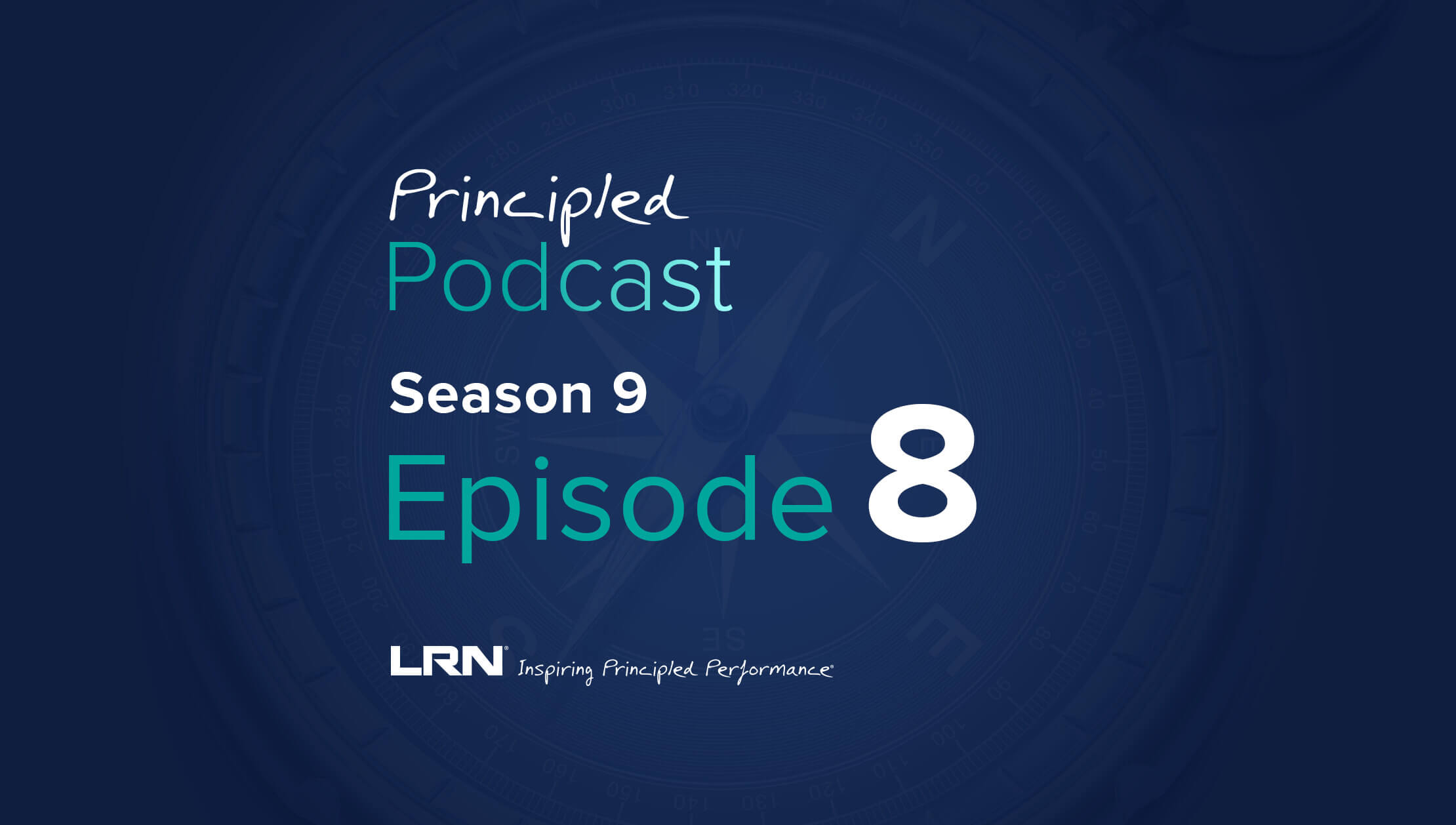What you'll learn on this podcast episode
“Culture needs to be a part of their dashboards and that intentionality from the board really sort of came out as a strong signal. That as a board, it can be a powerful signal to drive accountability from management in this way.” —Marsha Ershaghi Hames, Partner at Tapestry Networks
Corporate directors agree that culture is key, but their definition of it is elusive. In this episode of the Principled Podcast, LRN Special Advisor David Greenberg, who is also on the board of International Seaways, is joined by Dr. Marsha Ershaghi Hames, Partner at Tapestry Networks, to share notes from the recent forum on ethics, culture, and compliance. They find directors emphasizing that much of culture is implicit and rarely articulated. As one director said, “The deepest culture in a company involves the things we never discuss; they're never written down.” Yet there are a lot of ways boards can address and measure corporate culture and drive better outcomes. Listen in as Marsha and David discuss their experience at the summit which followed on the heels of the joint report from Tapestry Networks and LRN, Activating Culture and Ethics from the Boardroom.
Principled Podcast shownotes
-
[2:00] Who was present at the Activating Culture and Ethics from the Boardroom and what was the dialogue like?
-
[5:05] What were the conversations surrounding the idea of culture?
-
[12:58] What were Marsha’s key takeaways about measurement from the summit conversations?
-
[18:57] What do board members have to say in terms of culture and compensation?
-
[24:14] How would Greenberg describe the importance of trust between board members and chief ethics and compliance officers?
Where to stream
Be sure to subscribe to the Principled Podcast wherever you get your podcasts.
Guest: Marsha Ershagi Hames
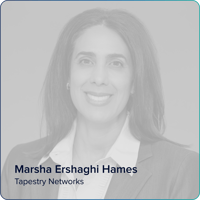
Marsha Ershagi Hames is a partner with Tapestry Networks and a leader of our corporate governance practice. She advises non-executive directors, C-suite executives, and in-house counsel on issues related to governance, culture transformation, board leadership, and stakeholder engagement.
Prior to joining Tapestry, Marsha was a managing director of strategy and development at LRN, Inc. a global governance, risk and compliance firm. She specialized in the alignment of leaders and organizations for effective corporate governance and organizational culture transformation. Her view is that compliance is no longer merely a legal matter but a strategic and reputational priority.
Marsha has been interviewed and cited by the media including CNBC, CNN, Ethisphere, HR Magazine, Compliance Week, The FCPA Report, Entrepreneur.com, Chief Learning Officer, ATD Talent & Development, Corporate Counsel Magazine, the Society of Corporate Compliance and Ethics and more. She hosted the “PRINCIPLED” Podcast, profiling the stories of some of the top transformational leaders in business.
Marsha serves as an expert fellow on USC’s Neely Center for Ethical Leadership and Decision Making and on the advisory boards of LMH Strategies, Inc. an integrative supply chain advisory firm and Compliance.ai, a regulatory change management firm.
Marsha holds an Ed.D. and MA from Pepperdine University. Her research was on the role of ethical leadership as an enabler of organizational culture change. Her BA is from the University of Southern California. She is a certified compliance and ethics professional.
Host: David Greenberg

David Greenberg serves as Chair of the Governance and Risk Assessment Committee and a member of the Audit Committee of International Seaways (NYSE: INSW), one of the largest global crude oil and petroleum tanker companies. Mr. Greenberg’s previous board experience (2006 to 2016) was as the independent director – and member of both the Audit and Compensation Committees --of APCO Worldwide, a private communications and government affairs consultancy and as a director (2013 to 2016) of Clean Tech Group, which creates opportunities for industrial companies to invest in innovative, clean technology. He also served for 5 years as Chairman of the Board of Trustees of The Keystone Center, a Colorado non-profit that brings together oil, chemical and pharmaceutical companies with leading NGOs to find solutions to complex public policy challenges at the federal and state levels.
Greenberg is currently Managing Director of Cortina Partners LLC, a private equity firm that owns companies in the air medical, addiction treatment, bedding, textile and outdoor recreation industries and is CEO of Acqua Recovery, a residential drug and alcohol addiction center. He also advises boards and executive teams on strategy, compliance, leadership and culture as a Special Advisor for LRN Corporation, and from 2008 through the end of 2016 was a member of LRN’s Executive Committee. For 20 years prior to 2008, Mr. Greenberg served in various senior positions overseeing government affairs, corporate affairs, communications and strategy at Altria Group, Inc. – then the parent company of Philip Morris USA, Philip Morris International, Kraft Foods and Miller Brewing – culminating in his role as Senior Vice President, Chief Compliance Officer and a member of the Executive Committee. As one of five senior vice presidents of the corporation, he served on the Management Committee, which oversaw all strategy and company operations. He was also a principal architect of the company’s very successful efforts to end the ‘tobacco wars’ which threatened the company’s very existence. Earlier in his career, Mr. Greenberg was a partner in the Washington D.C. law firm of Arnold & Porter and also served as Legislative Director and General Counsel of the Consumer Federation of America. He attended Williams College and has JD/MBA degrees from the University of Chicago.
Greenberg has testified before the U.S. Congress, the European Union, the Israeli Knesset and other governmental bodies over two dozen times and has appeared on ABC Nightline, the CBS Morning News, BBC Morning, and the PBS News Hour, and has spoken at leading events for CEOs and boards.
Principled Podcast transcription
Intro: Welcome to The Principled Podcast, brought to you by LRN. The Principled Podcast brings together the collective wisdom on ethics, business and compliance, transformative stories of leadership and inspiring workplace culture. Listen in to discover valuable strategies from our community of business leaders and workplace change makers.
David Greenberg: What is corporate culture and why does it matter when it comes to business outcomes? Do boards of directors have a special responsibility to oversee it? How can board members impact culture? How can they measure it? Hi, and welcome to another special episode of the Principled Podcast, where we're talking about boards of directors and their oversight of corporate culture, ethics and compliance. I'm your host, David Greenberg, special advisor at LRN and a member of the board of international seaways, the second largest global oil tanker company. I'm joined again today by Dr. Marsha Ershaghi Hames, partner at the management consulting firm Tapestry Networks. This is second in our series of conversations this season about the critical role of boards in shaping ethical corporate cultures. Marsha, welcome back. And it's great to have you.
Marsha Ershaghi Hames: It's good to be here, David.
David Greenberg: First, let's talk about the two day ethics, culture and compliance summit, which just concluded. It was a great opportunity to bring corporate directors back together alongside leaders of the ethics and compliance function to talk about the findings in the LRN Tapestry Networks report, activating culture and ethics from the boardroom. Marsha, tell us a little bit about who was there and the quality of the dialogue?
Marsha Ershaghi Hames: Yeah. David, so as you said, the summit can convened directors and these senior executives to kind of discuss the insights and the findings from the activating culture and ethics from the boardroom report across about a two day six hour kind of period. We had over 40 participants participate and they represented a spectrum of industries. We had financial services, consumer goods, pharmaceuticals, tech sector, energy. So it was a pretty diverse, I would say, set of perspectives and experiences. And what was really unique about this summit though, is that there were no outside guests. And so the dialogue, the exchange was really deep where peers were kind of asking each other questions. They were sharing. They were reflecting on their own challenges, lessons learned, their own experiences.
And I think what was also unique is because the exchange was between directors and senior executives, there was an opportunity to learn from one another in terms of what are you seeing kind of on the ground? What are, how are you working with mid to upper management? What are some of the programs looking like within the hallways and the corridors of businesses. And for senior executives to really get a perspective in terms of how the independent directors are seeing the holistic view of organizations. So we spent about, it was about six hours. We unpacked the various dimensions of the report that we're going to touch upon some of this culture, structure, relationship with management, measurement, accountability, and trust. So let's kind of jump into it.
David Greenberg: I just want to add that I thought it was remarkable to see board members from some of the biggest companies in the world being extremely engaged in this set of issues, pounding the table that ethics, compliance and culture are crucial for both business success and sustainability. And it felt like it was just the beginning, that they were eager to talk more and eager to bring the lessons back to their boardrooms and companies to take action. But Marsha Tapestry just published a report on the themes from the summit. It was clear that board members believe strongly that culture matters, that it's a crucial underpinning of winning ethical companies, yet everyone struggles in defining culture. There were a number of interesting takes on how to define it. So could you talk a little bit about what were they and what are the implications of the fact that culture can seem elusive even to directors who think it's crucial?
Marsha Ershaghi Hames: Uh-huh (affirmative). Yeah. The directors were emphasizing quite a bit that much of how culture is sort of experienced and embedded into the business is so implicit. It's not so much kind of the rules and written guidelines and policies, but it's more of a holistic kind of collective understanding of these are the unwritten hallmarks of the organization, but it's just how we do things around here. So, very implicit in that sense. But I'd like to call out one interesting insight is a number of directors talked about how culture can be experienced in different ways when you start to take in or consider the variety of functions and the geographies of the business, the types of business. And as they were discussing, evaluating and assessing culture, one director said that you really have to look at all the components, all the pieces, all the ingredients.
And then directors also emphasized the importance of the role of leaders, looking to a variety of senior executives, different types of roles and functions, to get more of an integrated view. For example, a number of directors said that while they look to the CEO for that holistic kind of lens into culture, a number indicated that they also look to other kind of functional business owners. Such as the chief ethics compliance officer, the chief HR officer, for insights and for ears on the culture. But David, in the conversations you were also hearing that a number of directors said it's really hard to keep a pulse on or keep a grasp on the unsaid portions of culture. How did you sort of draw upon some of the areas of the struggles of trying to get a read on the narrative of culture?
David Greenberg: I think one of the areas of confusion can be culture is everyone's job, and so sometimes that can mean it's no one's job. And there was a little bit of a discussion or debate about whether the chief ethics and compliance officer should be the owner of culture. And I think the important point here is obviously culture is broader than ethics and compliance. Culture is really about how everything happens around a company, particularly what happens when no one is looking. But for the ethics and compliance community it's really important to say that if the chief ethics and compliance officer and her team doesn't have a point of view on culture and a culture strategy for helping employees do the right thing and speak up when they have concerns, that's not going to be a successful ethics and compliance function. So I think that having more than one person, more than one executive, take ownership for culture and feel like culture is definitely in their domain and that they have a central role in it is critical.
Marsha Ershaghi Hames: Uh-huh (affirmative). And another thing that we should point out too, is that while there were so many different kinds of takes on, and we'll talk a little bit more about ownership and who the board looks to. I sense that one kind of theme that emerged from a number of these conversations is that most agreed that values were really crucial underpinnings. So to be explicit and to state and to signal the importance of building a values-based organization really came out as a strong theme. So David, compared with the formal structures of financial reporting and other types of common topics that boards address, boards lack well established protocols, processes, frameworks for the oversight of culture, ethics and compliance. So structure, how boards sort of organize themselves and develop kind of the more common structures and frameworks to address oversight of culture, ethics and compliance emerges another kind of key theme in the summit. David, what are some of your kind of thoughts on how this can be sort of addressed and some of the highlights you observed from the conversations in the summit?
David Greenberg: Marsha, this is a really important point. Culture, ethics and compliance are basically newcomers to the board agenda. And that agenda is crowded. It's not a trivial thing to find ways to have focused strategic discussions and committees and at full board meetings on these topics. In fact, it's really an uphill struggle, particularly in audit committees. I've been a member of three audit committees over the past 15 years and our agendas keep getting busier with topics that are absolutely must do from a legal and regulatory point of view. And I think most of the audit committee members at the summit agreed that this is a huge challenge.
So the first step is creating a sense of ownership over culture, ethics and compliance in the right place at the board. And that will be different for different companies. Some boards have established compliance committees, some have integrity and responsibilities committees. Others like my board at International Seaways give oversight responsibility on these issues to the governance committee, which I chair. The place doesn't matter, per se, what matters is the ability to have consistent focused discussions that get under the surface of what is driving ethics, compliance, and culture at a company?
The other key is to change common ethics and compliance reporting practices. We can't keep talking only about ethics and compliance activities. The number of employees trained, the number of calls to the helpline, the number of investigations and sanctions. We have to move the discussion to outcomes and underlying causes. We have to measure what's important, not what's just in motion. And so I think this is a good time for us to talk about measurement. There are actually quite a number of ways to measure culture and to get underneath the surface of corporate behavior and decision-making to reveal the drivers of good conduct and bad conduct. Yet again, board members at the summit seemed to struggle with measurement when it comes to culture. So what were your key takeaways about measurement from the summit conversations?
Marsha Ershaghi Hames: Yeah, it's interesting back before even the summit when we were conducting the study, David, one of the directors, I thought it was really notable, pointed out boards do not lack for data, but we lack narrative and interpretation of what the data is showing. And as you were talking a little bit about kind of the series of kind of activities that tend to be reported. So it's kind of these like point in time static dashboards. In the summit participants really focused on the importance of looking at the dynamics of data rather than looking at it as a static snapshot. So looking at the patterns and the trends over time really kind of surfaced in the discussion.
Another area that the exchange kind of moved into was the importance of getting into the trenches, like getting into the granularity of details and specifics. So understanding, let's say with large global organizations, are there certain geographies that are experiencing spikes over time? Are there patterns appearing in some of the averages or on the edges. A number of directors actually pointed to how they found value in seeing kind of the more qualitative sets of insights. For example, a few pointed to reading raw input or comments on surveys, just to try to get a sense of not only the delta, but are there certain signals of deeper or widespread issues that may not just be as evident on kind of the more static metrics. And then also combination. So David, a number of directors talked about the importance of correlating all these components. Not to rely heavily on a single source, but to look at other types of factors - revisions of policies, get input from HR and diversity and inclusion, look at the safety metrics, correlating maybe input on hotline calls to some of these other other factors.
And then there were also a few executives and directors that shared stories and experiences of where their organizations had conducted deeper dive focus groups. And they were very, I would say deliberate, in asking more probing and uncomfortable questions. So that also kind of came up as another kind of good practice and a trend.
However, I want to go back to a point that you made earlier, David, on kind of positioning the ownership of culture. And I wanted to sort of highlight for our listeners that while some mentioned the chief ethics compliance officer may be looked at, or turned to as the owner of culture or culture strategy or culture program and making this more of a priority, I think that most in the summit or in the conversation, and this is kind of to your point of have structures and processes, really focused on it's the spirit of building relationships that's really important. And these relationships don't happen over time, that the communication has to sort of be ongoing. So while you need a level of responsibility, there has to be ongoing conversations so that some of these patterns and correlations can sort of surface over time.
David Greenberg: I also wanted to say, it was interesting in the dialogue that there was appropriate, I guess, skepticism about surveys. We're all kind of surveyed to death. But there were also a number of directors who pointed out that the right kinds of survey questions can really uncover important themes and narratives in the company. If you're really trying to measure underlying drivers like trust, fear, organizational justice, whether executives and management are walking the walk in terms of company values and purpose, you can actually learn a lot.
Marsha Ershaghi Hames: Oh yes, absolutely. And going beyond that, because there were a few directors that highlighted some concern over this potential trend or shift to deeper reliance on some of the new technologies for deriving some of these metrics, let's say some of the more machine learning and the AI artificial intelligence that can sort of run and detect and point to patterns. But there was a concern that without going beyond that and having some of that more human intervention where you can sort of synthesize these patterns and drive more probing questions to get to the underpinning, to the root of the issues. So without that perspective, a few were kind of raising their hand and saying, let's not over rely on just kind of one derivative of pulling the data.
David Greenberg: One of the things that this whole discussion of measurement leads directly to is compensation and how these issues might relate to CEO and executive compensation. So given that board members universally say culture matters, what do they say when we turn to the topic of culture and comp?
Marsha Ershaghi Hames: I would say the big thing that came out of that is the importance of an integrated lens into it and deriving more balance. So the emphasis was as board we need to develop a greater balance around both the accountability and how we sort of structure incentives and comp. And there were some interesting comments. For example, there were some strong views about avoiding or discouraging the sense of rewarding executives for doing the right thing. So we had some good conversation, but very strong points of view around that. For example, there was a discussion, a specific discussion we had about how incentives can sometimes obscure signaling or sending the right message about ethical conduct or doing business with integrity, and to sort of highlight some strategies a few directors said that what they did is instead of rewarding or incentivizing doing the right thing, instead they've sort of treated incentives as a subtraction strategy or as a negative.
So a parallel was presented in the summit, for example, around safety culture. And they said we've got these, it's good to set goals, we should have goals. But if a particular safety goal had not been achieved, then there was a subtraction. And there were a couple of other directors who also said that while incentives can be obscuring in that sense, they do believe in punishment if there's a failure on metrics. As opposed to, let's say, rewarding doing business with integrity. The sort of debate and exchange that we noticed is that there shouldn't be this sort of choice of we are winning, but we can't win by doing the right thing. So it was more so the how we get there. We all agree that this is the outcome that we want to see, but how we get to the outcome is just as important as the outcome.
And in the discussion also I would say most that I observed agreed that that metrics are super, super critical, setting goals are critical, but again, the integration of applying values-based decision-making and the principles of the culture to how we build the products, how we lead our teams and so forth was important. And then lastly, I think another thing to kind of call out is the directors sort of focused on setting that commitment. So when the board devotes time and attention to culture, when they ask, when they're sending setting that tone, they're asking management to report on culture. Culture needs to be a part of their dashboards and that intentionality from the board really sort of came out as a strong signal. That as a board, it can be a powerful signal to drive accountability from management in this way.
David Greenberg: You can become a little too mechanistic or mechanical about compensation formulas. The important point is management pays attention to whatever the board is paying attention to. And if there are clear expectations on the CEO and the senior team that culture, ethics and compliance are important, that they're going to be discussed, and that there are expectations about how you drive them, maybe it doesn't matter so much whether they're 5% of a compensation formula or not. I think management gets the signal if the signal is sent.
Marsha Ershaghi Hames: They certain, and they're looking for consistency too. They're looking to see that this is, these signals and these kinds of commitments are not in reaction to, but that this is just the tone of this is how we are running the business in the organization. So that kind of came loud and clear. But building on kind of the sense of communication and creating a more, I would say, open and transparent exchange between the board and the management team. David, you certainly sat kind of on both sides of the table here, both as a chief ethics and compliance officer and a member of a board. And the concept of trust came up quite a bit between both the dialogue, the exchange between board and members of management, and the importance of building relationship. In your experience, what are some of the kind of important implications for chief ethics and compliance officers who are listening in today to really understand the critical importance of building and fostering trust with the board and in establishing relationships with the board?
David Greenberg: Yeah, I wish every chief ethics and compliance officer could have heard that part of the summit discussion because it was amazing the extent to which board members stress that trust drives good board governance and good oversight. And that's trust between management and the board and that's trust within the board among the board members themselves. And it's simple, but so true. Think about it, so much goes on in a major company. There are so many countries, so many business units, so many competitive forces, so much change that the companies coping with from society and from government. So how does a board know that management is bringing forward what the board needs to know when the board needs to know it? How can board members know that the chairman or lead director is openly discussing what he or she hears from the CEO? The answer has got to be in trust and transparency.
And what the directors all said is that building a culture of trust and transparency is no easy thing. It takes time, it takes openness, it takes vulnerability, it takes humility. So some of the things that board members at the summit pointed to are simple but important, and not always easy to find time for time for. Learning about each other's lives. Time for meals and drinks together. Time to get to know management below the top level, who they always see at board meetings. Being able to discuss strategy in an open way at offsite retreats. All of the discussions outside of formal board meetings. And I think in the end this is about relationships. It's about real relationships, not superficial relationships. And so I think this is a good place to kind of wrap up this whole area of relationships is a major challenge for ethics and compliance executives.
Do we really have a relationship with board members and the key chair of the committee that oversees us? Could board members pick us out of a lineup? I think job one is building that relationship and finding a way outside a board member, outside of board meetings, to involve key board members in ethics and compliance and culture strategy, measures, and key initiatives. Finding a time to do deep dives on major instances of misconduct and the lessons learned. Making sure that we make the case that culture is an important part of the purview of ethics and compliance. Maybe not as sole owner, but as part of making sure that there's a strategy to support doing the right thing. So for those ethics and compliance executives who are listening and believe their boards may not care or may not care enough, I think the summit discussions point to the opposite conclusion.
Board members care deeply. They don't always know how to execute on those deep feelings. So this is the leadership opportunity and challenge for the ethics and compliance community to bridge the gap between the right intentions in the boardroom and the trust and relationships needed to create strong board support in tone from the very top, that in the end will power great culture outcomes in our companies.
So Marsha, it looks like we're running out of time today. It's been really great having you on the Principled Podcast. I look forward to continuing the conversation about the role of the board in shaping ethics and culture with you in a future podcast and in our next forums together. So thank you very much.
Marsha Ershaghi Hames: Thank you. Thanks for having me on. And I feel like we're just at the beginning. So, looking forward to continuing the dialogue across the board.
Outro: We hope you enjoyed this episode. The Principled Podcast is brought to you by LRN. At LRN, our mission is to inspire principled performance in global organizations by helping them foster winning ethical cultures rooted in sustainable values. Please visit us at lrn.com to learn more. And if you enjoyed this episode, subscribe to our podcasts on Apple Podcasts, Stitcher, Google Podcasts, or wherever you listen. And don't forget to leave us a review.
Be sure to subscribe to the Principled Podcast wherever you get your podcasts.
